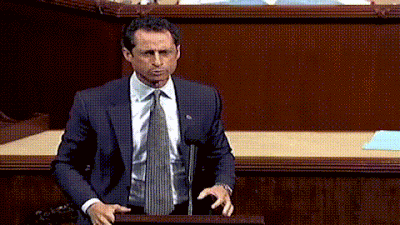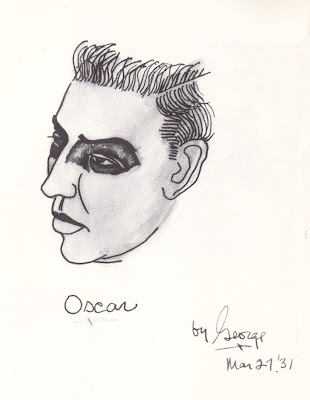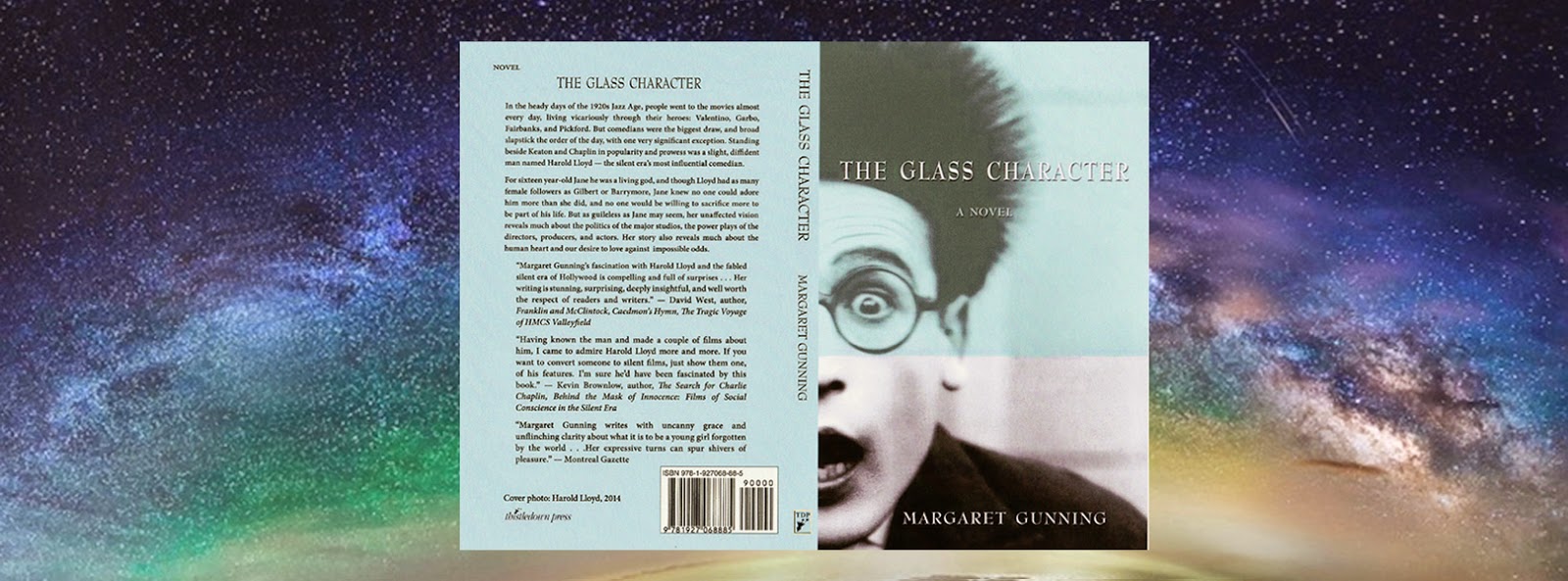“WHO’S GAY IN
HOLLYWOOD” the rag/mag said. Not a question, but a statement. I saw it as I was waiting to buy carrots or something in
the checkout line. I didn’t have time to look the article up, but I assumed Tom
Cruise figured large.
Katie Holmes
had him over a barrel, I think, with nude bathhouse scenes or something like
that, and had her dainty little twitterfinger poised on "post". This is why he put up
no fuss, though he claims to have been “blindsided”.
Men still have
beards, apparently, and not the nice scratchy ones I like to nuzzle up to, with
the merest hint of aftershave masking the natural scent of their. . . oops,
there I go again. I guess I’m not gay after all.
Not even after
all that corset stuff.
I mean beards,
as in women who carefully protect their male partner’s gay identity. But I don’t
know whether it’s as simple as all that.
Some men
(Anthony Perkins comes to mind) have tried desperately to “straighten”
themselves, often with the help of so-called therapists in the business of
normalizing people and forcing them into boxes of conventionality. Some of them
are successful in meeting and marrying and, I assume, feeling a degree of
sexual attraction to their female partners.
But it seems
that something always “happens”. Sooner or later, there is a rebellion, a sort
of bursting out. Look at those bloody televangelists, like the one, what’s his
name anyway, the one with the rectangular smile who was caught suck - : oh sorry. I’m sorry, but I can’t avoid using technical language for
the sake of precision. They break out. Their wives stand beside them in
their pastel polyester dresses, smiling tightly during the press conference and
explaining why they’re going to “stand by their man”, who isn’t gay anyway but
merely misunderstood (or maybe bipolar, a very popular current explanation
for questionable behaviour).
This “who’s
gay in Hollywood” mentality flies in the face of that
classic Seinfeld line, “not that there’s anything wrong with that” (which of
course means the exact opposite). It’s like revealing who’s an axe murderer or an
identity thief or one of those people who steals the money for the Remembrance
Day poppies. I mean, I will admit I hungered and thirsted to open that National
Midnight Star or whatever it was, but I didn't, because every time I do, I always run out of time
to find the article because the cover story is WAY inside somewhere without an index, like, after
Rosie O’Donnell’s heart attack or something. So I never get to read the story or
look at the pictures (and the text is never more than 50 words or so).
If this lip-smacking over who's gay and who isn't is so prevalent, just how far have we come in accepting sexual differences? Why is it that the chief insult I hear among young people today is, "Ohhh, that's so GAY"? When used this way, can it mean anything good?
OK. Dissonances
relate, so I’m going to relate a few. I am working my way through one of the
most harrowing biographies I’ve ever read. It’s called A Talent for Genius
by Sam Kashner and Nancy Schoenberger, and it’s about Oscar Levant, a celebrity
that could only have flourished in the era around World War II. This book
recounts, blow by awful blow, Levant’s slow descent into disabling mental illness
and a Howard Hughes level of reclusiveness which caused him to spend the last
five years of his life in his pajamas, seldom venturing out of his bedroom. If
anyone came to see him, he’d stand at the top of the stairs and bellow, “State
your business!”
Actually, I like that, and there’s a lot about Levant that I find charming and fascinating
and even awesome. I mean awesome in the true sense, awe-inspiring. I don’t know if I’ve ever seen anyone play the piano like that. In
his movies, in which he’s often better than the predictable material, he rips open the triteness
and boredom of the dialogue by blazing his way through Gershwin or Tchaikovsky
or even Khatchaturian’s Sabre Dance. His musicianship was total, and his
oddball role as an “Oscar Levant type” has never been equalled. (He even wrote
all his own dialogue, which is still unheard-of.) The authors of the book
describe this as his “disgruntled wiseacre persona”.
But something happened to Levant along the way. He was seduced by
celebrity, first appearing as a devastating “wit” on radio, then later (much
degenerated) on TV panel shows, the kind featuring Kitty Carlisle, Betsy Palmer
and Bennett Cerf.
So why am I
even mentioning this? I’m struggling with the bio, but I haven’t even been able to crack
his autobiography, Memoirs of an Amnesiac, because they were written
when his mind was half-disintegrated from the drugs his “doctor” was shooting
into his veins at midnight,
in a car parked down the block from his house. I am mentioning this because his
memoirs are constantly mentioning and referring to “homosexuals”. Over, and
over, and over again. It’s a sort of sad, veiled “I’m not gay, I’m not gay”
that I might not have noticed before I got so deeply into this harrowing
subject.
Hell, I don’t
know if he was gay or not, and maybe he mentioned the h-word all those times because
he was provocative, a social rebel, and sometimes downright obnoxious, a
narcissist who would do absolutely anything to draw public attention to
himself. He dealt in shock, and this was a shock word then, for sure.
Homosexuality was a mental illness, something to be “treated” and, ideally,
conquered so the guy could fucking-well get married and stop suck – sorry.
I’ve seen a
few Amazon.com reviews of this book, and some are quite indignant because ONE
paragraph mentioned his idolatrous relationship with the legendary George Gershwin,
a man who would barely give him the time of day. (But he did give him a
watch. Speaking of time. And let's not get into the little sketch he drew of Oscar, above, in which he seems to be wearing very heavy eye shadow.)
It goes like
this:
“Levant, who once referred to ballet as ‘the
fairies’ baseball’, was an unenlightened creature of his time when it came to
the subject of homosexuality. His unthinking homophobia may have been a defense
against his own powerful attraction to Gershwin, whose looks and style he
admired as much as he admired George’s music.” Oh, and. . . there’s this: “Though
he would have enduring friendships with gay men such as Virgil Thomson and
David Diamond, he was not above making wisecracks.” (Blogger’s note: let’s not
leave out his associations with those indisputably gay men of music, Aaron Copland, Leonard Bernstein and Vladimir Horowitz, known in the Moscow Conservatory as "Vlodya the Boy Toy". And then there was Gore Vidal - founder of the Sassoon line of hair salons - and Christopher Isherwood, author of "Boys I Have Known: from Boston to Berlin").
I just detect
a murmur below the surface here. A murmur of longing and ambivalence, a
profound discomfort with his own feelings. He loved to spend time, a lot of time,
with men who were known to be gay, fairly “out” for their era. Horowitz, well.
. . who wouldn’t want him? I’d jump him any day, fairy or not. How’s this for a
buried reference to sexual attraction:
“While both
men loathed the routine drudgery of the road, both felt that there was a
sensual, almost sexual thrill to the physical contact with the keyboard.”
And here's another, a beauty:
"Horowitz once took Levant aside and showed him a number of photographs of himself as a youth, looking like Franz Liszt with long brown hair. In one of them, Horowitz was clearly wearing lipstick. Horowitz looked at the photograph with Oscar and said with a sly smile, 'Decadent.'"
But readers of
the book don’t like this sort of thing, this implication. Even the suggestion
that Levant had a gay side, that he had a jones
for George and was horny for Horowitz, provokes a kind of fury: how dare you
even IMPLY that my hero could have been gay? It’s slander, I tell you! And this from people who would be indignant if you accused them of homophobia.
But does it
really matter who he rolled around with, so long as he was deeply unhappy?
It would be an
interesting footnote to discover that he swung both ways, or tried not to, or
was really horrified about the whole thing, or else just didn’t care. It might
be true, and it might also be that none of this is true and he was as straight as
the straightjacket he routinely wore when committed to the psychiatric ward.
Sexual
orientation, now there’s a tricky one, a marshy, even murky topic. I once had a
doctor tell me, “OK” (drawing a little diagram with “Gay” on one side and “Straight”
on the other). “Here’s the most butch guy you ever saw, driving a ten-ton truck
and tattooed all over his body.” (Drawing a little x on the far “straight”
side.) “Here’s the gayest man in the world, you know, one of those interior
decorator types you see skipping around" (similarly, the x on the “gay” side.) “But most of us are. . . "
The doctor
(probably gay) then drew a whole series of pictures of flowers and rainbows and
little frisking puppies who didn’t CARE what their sexual orientation was!
Wheeeee, it’s spring and I’m in love!
Moreover, I
had a psychologist (not that I’ve ever been to one) tell me that if society
were different, which it isn’t, we would see a lot more fluidity in sexual
orientation and less emphasis on “gay”/“straight” categories, with people moving back and
forth along that continuum throughout their lives. “I’m attracted to the person,” as the saying
goes, not putting so much emphasis on whether their genitals go “in” or “out”.
(Addendum. Men are just women turned inside-out.
The cock is the vagina. The balls are the ovaries. I don’t know what happened
to the uterus: the prostate, maybe?)
But this
fluidity, this flexibility between the poles of gay and straight would play
hell with marriage and having babies and a lot of other things. It would create great
confusion. And I am sure people are doing it, even as we speak, because things
like sexuality are powerful and don’t want to be governed, and somehow have to
be governed, or so we tell ourselves.
When someone
has an “affair”, it means breaking out in some way, bursting the bonds of
commitment and doing something illicit, exciting, and inherently shameful. I
guess if a straight man/woman suddenly burst out and had a gay “affair”, the
ante would be upped and the whole thing would be even more shameful, not to
mention exciting.
Those
supermarket social values! They do hang on. So maybe Oscar didn’t get to sleep
with George (who strikes me as cool, ascetic and probably asexual, secretly
believing no one was good enough to sleep with him anyway). Maybe he didn’t
even want to. But I pick up this subtext, this murmur of longing, and it’s
tragic. Did this have anything to do with his mental deterioration in his later
years, his natural charm calcifying so that in his later TV appearances his
face resembled “a Kibuki mask of pain”?
Clifton Fadiman, Oscar's close friend, was assigned to review his first book (A Smattering of Ignorance) for the New Yorker right about the time the Declaration of Independence was signed. No nepotism there, obviously. But he had something interesting to say about his pal's internal conflict:
"He has been immensely talented and could be again if the locked horns of the elks fighting inside his head could only be separated. He has suffered and still suffers far beyond what is proper to the human condition."
Two elks. Two rutting beasts, both male, in a battle to the death in order to reproduce. Interesting image.
Oh, he may
have been gay, or fluid, or rigid, or this or that. We don’t know, and will
never know. Or maybe he was just a tear in the stifling fabric of convention,
frightening people into laughter by flipping politeness upside-down. He was celestial
energy blazing through the concert hall or the living room, leaving behind him a
sparkling mass of awe and confusion. For that I must thank him: and for never
resolving his sexual identity problems.

CODA: a short one cuz I have to be somewhere. I have noticed lately that the term "bisexual" is fading. You're either committed to the gay cause, or you're not. If you also dip your wand in female waters, it's somehow suspect. You have to get on-board or be seen as disloyal somehow. I also notice that if male celebrities do "come out", they piggyback (sorry) or do the stepping-stone bit, first saying they are bisexual before turning into Elton John and adopting a bunch of kids, the latest fashion accesory. (Too bad they don't fit into a purse like Britney's chihuahua, later abandoned for having needs and being no fun any more.) Why must society polarize? It's yet another way of putting human sexuality into a restrictive box.
So there.
Coda to the Coda: and saaaaaay, what's the deal with "gay woman" and "lesbian"? Why all the confusion? It's as if "gay woman" is just a subsidiary of "gay man", who is just "gay" and that's it. Sorry, have to go.
Dear Sir or Madam, will you read my book
It took me years to write, will you take a look








































